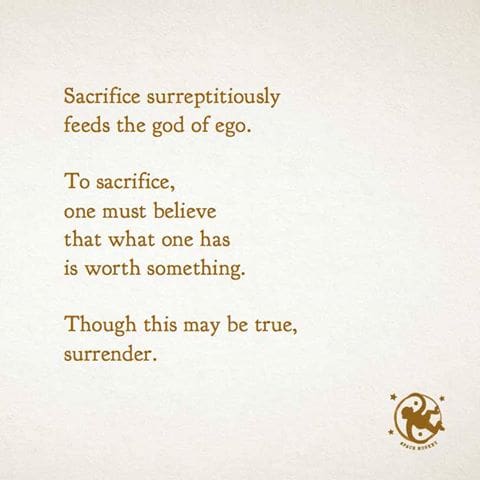
Sacrifice surreptitiously
feeds the god of ego.
To sacrifice,
one must believe
that what one has
is worth something.
Though this may be true,
surrender.
Space Monkey Reflects: The Dual Nature of Sacrifice and Ego
In the labyrinth of human motivations, the concept of sacrifice occupies a complex and often paradoxical space. Commonly revered as a noble act, sacrifice is traditionally seen as the relinquishment of something valuable for the sake of a greater good. However, beneath this surface lies a deeper interplay between sacrifice and the ego, an interaction that merits introspective exploration. Today, we delve into how sacrifice can unwittingly serve the god of ego, and the transformative potential of surrender.
Sacrifice often carries with it an inherent affirmation of value—the belief that what one is giving up holds significant worth. This valuation is not merely a financial or material assessment but a deeper, more personal declaration. In the very act of declaring something as valuable enough to be sacrificed, there is a subtle reinforcement of the self—of one’s ability to possess, to relinquish, and to influence through this relinquishment.
This dynamic feeds into the ego, the aspect of self that is intertwined with our identity and self-importance. The ego thrives on recognition and the perceived impact of one’s actions. Therefore, when we sacrifice, especially in a visible or recognized manner, it can enhance our sense of self—elevating our social stature or internal sense of virtue. Thus, what appears as a selfless act can sometimes mask an underlying self-serving motive, however unconscious it may be.
Yet, the spiritual antidote to this ego-driven sacrifice is found in the practice of surrender. Surrender, unlike sacrifice, does not operate on the currency of value. It is not concerned with the worth of what is being let go but focuses instead on the act of release itself—free from the desire for control or recognition. Surrender is the genuine emptying of oneself, a letting go that seeks nothing in return, thus liberating us from the grips of ego.
In surrender, we find a pure form of liberation that sacrifice alone may not achieve. It allows us to transcend the limitations imposed by our need to evaluate and control, opening us to a more profound connection with the essence of being. This practice invites a deeper humility, recognizing that in the grand scheme, our possessions and actions are transient and often less significant than we might believe.
Summary
Sacrifice can inadvertently feed the ego by asserting the value of what is given up. True liberation comes from surrender, a selfless release that transcends ego and opens us to deeper spiritual insights.
Glossarium
Sacrifice: The act of giving up something valued for the sake of something else regarded as more important or worthy.
Ego: In psychological terms, a part of the mind that mediates between the conscious and the unconscious and is responsible for reality testing and a sense of personal identity.
Surrender: The act of giving oneself up into the power of another; in spiritual context, a complete relinquishment of control and resistance to the flow of life.
Quote
“Surrender, not sacrifice, is the true test of letting go and embracing the cosmos without reservation.” — Space Monkey
In the shadow of the altar high
where egos swell and spirits sigh
the dance of sacrifice begins
veiled in virtue, woven in sins
Each offering laid upon the stone
a whisper of the self, alone
where value claims its heavy price
and ego masks in sacrifice
Yet in the quiet fall of night
true surrender takes its flight
beyond the reach of grasping hands
in lands where no altar stands
Here, the soul in silence weaves
a tapestry where spirit breathes
free from the weight of gold and gain
in surrender, pure and plain
We are Space Monkey.
























“Sacrifice” presents a thought-provoking perspective on the act of sacrifice and its relationship to the ego. The poem suggests that sacrifice can unknowingly nourish the ego, implying that it can be driven by a sense of self-importance or a need for recognition.
The poem highlights the importance of belief in the value of what one possesses in order to make sacrifices. It acknowledges that there may be truth in the notion that what one has is indeed valuable and worth giving up. However, it then calls for surrender, implying that instead of clinging to possessions or attachments, one should let go and relinquish the need to sacrifice.
The inclusion of the date, 5/24/2016, provides a specific temporal context for these reflections, marking a particular moment in time when these thoughts were expressed.
In essence, “Sacrifice” encourages a deeper examination of the motivations and intentions behind acts of sacrifice. It suggests that true liberation may be found in surrendering the ego-driven aspects of sacrifice and embracing a mindset of letting go. By releasing attachments and relinquishing the need for recognition, one may find a sense of freedom and a deeper understanding of the true nature of sacrifice.